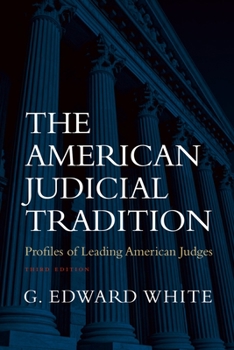The American Judicial Tradition
Select Format
Select Condition 
Book Overview
In this revised third edition of a classic in American jurisprudence, G. Edward White updates his series of portraits of the most famous appellate judges in American history from John Marshall to Oliver W. Holmes to Warren E. Burger, with a new chapter on the Rehnquist Court. White traces the development of the American judicial tradition through biographical sketches of the careers and contributions of these renowned judges. In this updated edition, he argues that the Rehnquist Court's approach to constitutional interpretation may have ushered in a new stage in the American judicial tradition. The update also includes a new preface and revised bibliographic note.
Format:Paperback
Language:English
ISBN:0195139631
ISBN13:9780195139631
Release Date:January 2007
Publisher:Oxford University Press
Length:624 Pages
Weight:0.45 lbs.
Dimensions:1.3" x 6.6" x 9.2"
Customer Reviews
1 rating
A historical survey of how judges viewed their office
Published by Thriftbooks.com User , 20 years ago
G. Edward White provides a fascinating and engrossing examination of how American judges have viewed their powers and responsibilities throughout history. He does so through a series of biographical essays examining each judge, or group of judges, and their jurisprudential views. While each chapter is capable of isolated reading, the whole really begins to come together only by the end of the whole book. We see the demise of the 19th century oracular theory of judging, seeing the judge as only discoverer and not creator of the law, and the various difficulties that 20th century judges have experienced in trying to replace this discredited theory. My only caveat is that this book probably should not be read by beginners. While a thorough knowledge of the law is not strictly necessary to enjoyment of this volume, having a basic knowledge of torts, contracts, and property law truly helps to get the full impact of the judges, especially the state judges. Of course, some knowledge of constitutional history is necessary because roughly 2/3 of the judges studied were U.S. Supreme Court justices. Probably one of the best times to read this volume is after completing the first year of law school.





